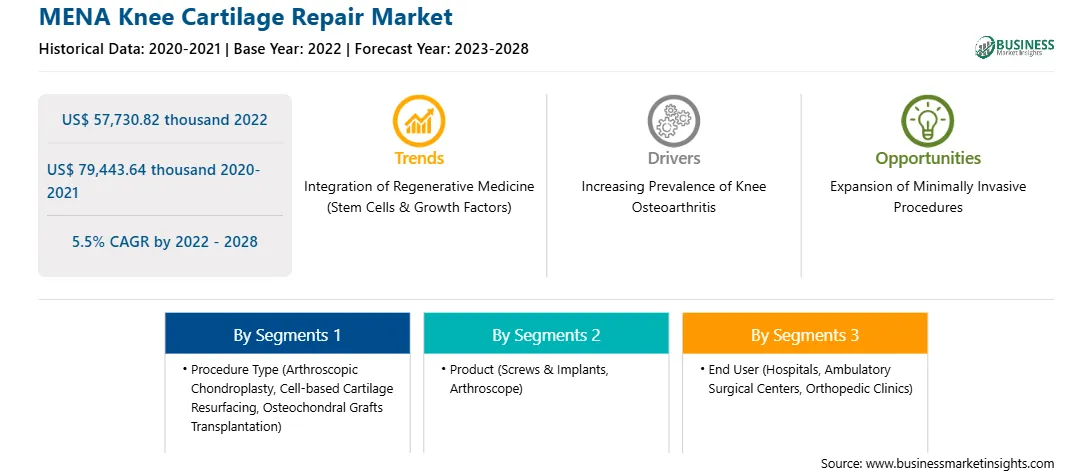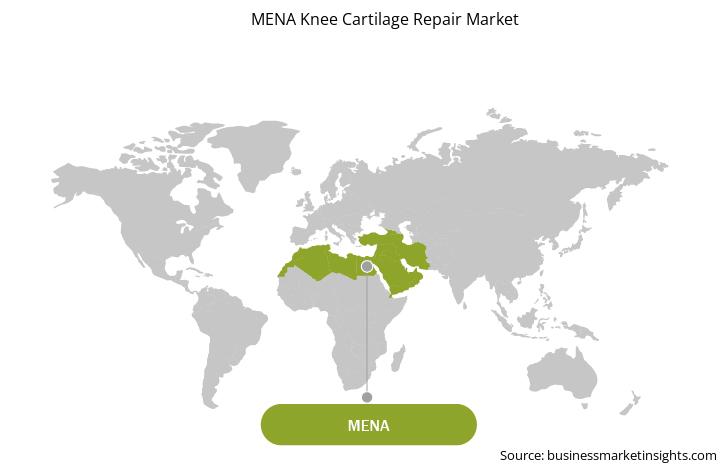The market growth is attributed to rise in prevalence of osteoarthritis and developments in orthopedic field. However, use of stem cell therapy in orthopedics is hindering the MENA knee cartilage repair market growth.
Various studies have shown that arthritis is commonly identified as a public health concern in adults. In addition, the inflammation of the joints is increasing in the younger population and is contributing to the rise of osteoarthritis. According to the research article “Assessing the Burden of Osteoarthritis in Africa and the Middle East: A Rapid Evidence Assessment,” published in February 2023 by Dovepress, in MENA, the age-standardized prevalence of osteoarthritis (OA) in 2019 was 5,342.8 per 100,000 people. Similarly, the annual incidence rate of OA in 2019 was 430.4 per 100,000 people. The prevalence is expected to increase as the population ages. Other factors that give rise to the incidence are obesity and menopause in females. According to “Prevalence of Symptomatic Knee Osteoarthritis in Saudi Arabia and Associated Modifiable and Non-Modifiable Risk Factors: A Population-Based Cross-Sectional Study,” published in March 2023 by the National Library of Medicine, 60.6% of people of age group 66–75 and 30.8% of people of age group 46–55 were affected by OA in Saudi Arabia. The report also stated that 39.75% of the total population in Saudi Arabia, including 60.9% of females and 53.3% of males, suffers from knee OA. These factors contribute to MENA knee cartilage repair market growth.
As per the article published by the National Library of Medicine in September 2021, “Prevalence and Incidence of Osteoarthritis: A Population-Based Retrospective Cohort Study,” in 2018, one in seven women aged 18 years and more showed a clinical diagnosis of OA either in Israel or in the periphery of the region or Maccabi Healthcare Services (MHS). The reports state that the incidence of OA is likely to be increasing due to the aging population and an obesity pandemic in Israel. Therefore, the rise in the prevalence of osteoarthritis is increasing the demand for cartilage repair procedures across the region and thus contributing to MENA knee cartilage repair market growth.
The MENA knee cartilage repair market, based on product, is segmented into implants, screws, arthroscope, and others. The arthroscopic system segment held the largest share of the market in 2022. However, screws & implant segment is anticipated to register the highest CAGR of 6.0% in the market during 2022–2028. An artificial component known as a knee implant replaces the damaged knee and mimics the function of a knee. These implants comprise metal alloys, plastics, and ceramic materials. Depending on the age, weight, and need, implants vary. The metal parts of the implant are made of titanium or cobalt-chromium-based alloys. The plastic parts are made of medical-grade polyethylene. Some implants are made of ceramics or ceramic and metal mixtures, such as oxidized zirconium. FibroFix Cartilage is a silk-based implant that repairs knee cartilage. The implant is biostable and biocompatible, copying cartilage function and supporting cartilage regeneration at a considerably lower cost than other solutions. The implant allows prolonged joint use, reduces pain, increases mobility, and prevents total knee replacement. Cartiva SCI (Stryker) is a novel osteochondral defect repair implant with properties similar to cartilage, designed to treat first metatarsophalangeal joint osteoarthritis. Agili-C (CartiHeal) is a porous and biocompatible implant used in cartilage and osteochondral defects in traumatic and osteoarthritic joints. The implant is a resorbable bi-phasic scaffold comprising interconnected natural inorganic calcium carbonate. Thus, these factors promote the growth of MENA knee cartilage repair market.
Osteochondral fragments, flaps, or grafts with sufficient bone stock are ideal for fixation with compression screws. Bio-compression screws (Arthrex) offer interfragmentary compression and a headless profile to promote healing for fracture and osteotomy fixation in periarticular applications. The screws are made of solid-enhanced PLLA (poly-L-lactic acid), absorbed over time without losing strength during the healing phase. Trinion (Inion company) is a meniscus screw used in knee cartilage repair. Trinion screws are used to fix longitudinal vertical meniscus lesions where the knee cartilage has torn. This screw has a dual-head screw which allows for optimal fixation and a headless design that provides complete insertion into the meniscus to avoid chondral lesion development. In order to aid surgeons, the screws are colored to allow improved visibility in arthroscopic procedures and are cannulated for increased ease of insertion. Thus, these factors contribute to the growth of segment which in turn promotes the growth of MENA knee cartilage repair market.
Strategic insights for the MENA Knee Cartilage Repair provides data-driven analysis of the industry landscape, including current trends, key players, and regional nuances. These insights offer actionable recommendations, enabling readers to differentiate themselves from competitors by identifying untapped segments or developing unique value propositions. Leveraging data analytics, these insights help industry players anticipate the market shifts, whether investors, manufacturers, or other stakeholders. A future-oriented perspective is essential, helping stakeholders anticipate market shifts and position themselves for long-term success in this dynamic region. Ultimately, effective strategic insights empower readers to make informed decisions that drive profitability and achieve their business objectives within the market.

| Report Attribute | Details |
|---|---|
| Market size in 2022 | US$ 57,730.82 thousand |
| Market Size by 2028 | US$ 79,443.64 thousand |
| Global CAGR (2022 - 2028) | 5.5% |
| Historical Data | 2020-2021 |
| Forecast period | 2023-2028 |
| Segments Covered |
By Procedure Type
|
| Regions and Countries Covered | MENA
|
| Market leaders and key company profiles |
The geographic scope of the MENA Knee Cartilage Repair refers to the specific areas in which a business operates and competes. Understanding local distinctions, such as diverse consumer preferences (e.g., demand for specific plug types or battery backup durations), varying economic conditions, and regulatory environments, is crucial for tailoring strategies to specific markets. Businesses can expand their reach by identifying underserved areas or adapting their offerings to meet local demands. A clear market focus allows for more effective resource allocation, targeted marketing campaigns, and better positioning against local competitors, ultimately driving growth in those targeted areas.

The MENA Knee Cartilage Repair Market is valued at US$ 57,730.82 thousand in 2022, it is projected to reach US$ 79,443.64 thousand by 2028.
As per our report MENA Knee Cartilage Repair Market, the market size is valued at US$ 57,730.82 thousand in 2022, projecting it to reach US$ 79,443.64 thousand by 2028. This translates to a CAGR of approximately 5.5% during the forecast period.
The MENA Knee Cartilage Repair Market report typically cover these key segments-
The historic period, base year, and forecast period can vary slightly depending on the specific market research report. However, for the MENA Knee Cartilage Repair Market report:
The MENA Knee Cartilage Repair Market is populated by several key players, each contributing to its growth and innovation. Some of the major players include:
The MENA Knee Cartilage Repair Market report is valuable for diverse stakeholders, including:
Essentially, anyone involved in or considering involvement in the MENA Knee Cartilage Repair Market value chain can benefit from the information contained in a comprehensive market report.